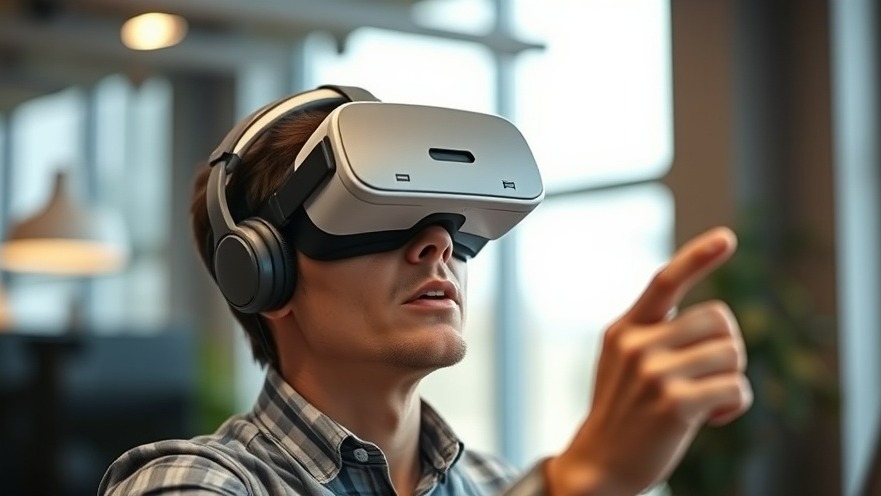
The Rise of Speech Anxiety: A Growing Concern
Public speaking anxiety is often cited as the most prevalent fear worldwide. With increasing societal pressures and digital connectivity, it's alarming to see a rise in both social anxiety and public speaking fears. This phenomenon can have detrimental effects, limiting personal and professional growth and leading to poor mental health outcomes. Understanding these challenges is critical for health practitioners who aim to help their patients build resilience in overcoming these fears.
Virtual Reality: Transforming Public Speaking Skills
Dr. Chris Macdonald from the University of Cambridge has developed an innovative virtual reality platform that allows users to practice public speaking in a controlled yet engaging environment. By simulating various challenging settings, from empty classrooms to large stadiums packed with virtual spectators, the platform effectively utilizes exposure therapy principles. Users can start from basic scenarios and progress to the most daunting settings, gradually desensitizing them to their fears.
Accessibility for All: A Cost-Effective Solution
One of the standout features of this platform is its accessibility. Dr. Macdonald's design allows smartphones to be used as VR headsets through inexpensive device mounts, making this invaluable resource available to nearly everyone. Given that only 5% of households in the UK own a VR headset, this approach democratizes access to effective public speaking training. This innovative application is not just a cost-saving measure; it also encourages a wider variety of individuals to participate and practice utilizing technology effectively.
Quick Gains in Confidence: Research Findings
The platform has demonstrated impressive results. In a recent study, participants reported significant increases in confidence after just a single 30-minute session. In trials involving students from renowned universities like Cambridge and UCL, every participant shared that they benefitted from self-guided usage after a week, feeling more prepared and less anxious when faced with public speaking challenges. This speed of impact could transform how we address speech anxiety across different demographics.
Enhancing Learning Through User-Centric Design
Dr. Macdonald's iterative, user-centric design process involved over 50,000 practice presentations during platform testing. This collaborative methodology not only refined the platform but also ensured that it remained relevant to users' needs. Engaging with diverse group settings, from local markets to tech events, the lab gathered invaluable feedback that equips users with real-world public speaking scenarios.
The Impact of Overexposure Therapy
The theoretical framework behind the platform employs the concept of 'overexposure therapy.' By allowing users to practice in intentionally overstimulating environments, such as stadiums filled with distractions, the platform prepares them for less daunting real-life scenarios. This method is akin to training with weights: the more one practices in tough scenarios, the more resilient they become in typical situations.
Broader Implications: Not Just Public Speaking
This platform’s impact extends beyond merely public speaking. With features tailored for scenarios like job interviews and broadcast presentations, it spans various communication needs. By fostering confidence in these areas, individuals can pursue career advancements and personal goals that may have previously seemed out of reach due to anxiety.
Embracing Digital Transformation in Mental Health Solutions
As we witness rapid advancements in digital healthcare, platforms like this exemplify the potential for technology to bridge accessibility gaps in mental health treatment. While traditional therapies can involve lengthy waiting times and high costs, this VR solution not only saves resources but also aligns with modern, tech-savvy lifestyles. It’s pivotal for health practitioners to remain aware of such advancements, as they could significantly enhance patient outcomes.
Encouraging Participation and Support
As the platform enters the public phase, Dr. Macdonald emphasizes the need for community engagement and support, funding future developments to expand its reach and effectiveness. For practitioners, encouraging patients to utilize this resource not only empowers individuals but also fosters a proactive stance towards managing anxiety. Collectively, we can transform the narrative around public speaking stress into one of empowerment and skill-building.
In conclusion, embracing virtual reality as a tool to combat speech anxiety changes the paradigm around public speaking. Encouraging users to engage with the platform is vital, as each step taken towards confidence is a step towards improving their quality of life and professional prospects.
 Add Row
Add Row  Add
Add 






Write A Comment